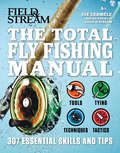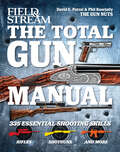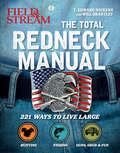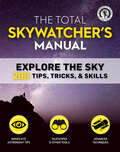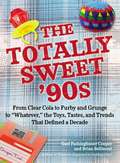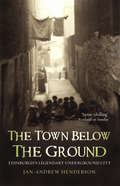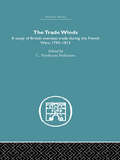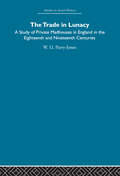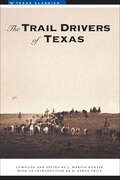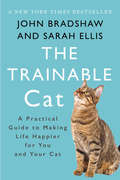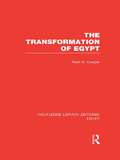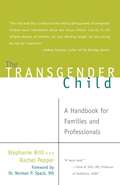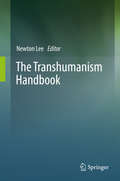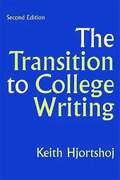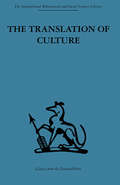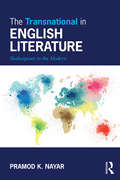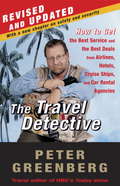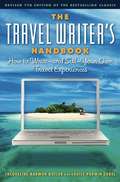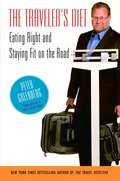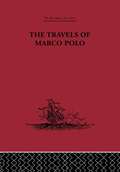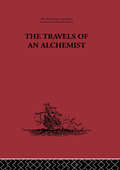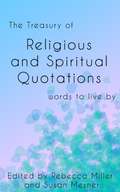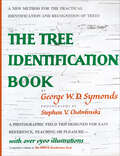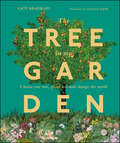- Table View
- List View
The Total Flyfishing Manual: 307 Essential Skills and Tips (Field & Stream)
by The Editors of Field & Stream Joe CermeleThe most comprehensive fly fishing guide with the best tips, old school-techniques, tactics, and up-to-date gear reviews.Filled with over three hundred hints from the best anglers in both salt and fresh water, the editors of Field and Stream give you everything you need to make the perfect pitch, find a secret spot, and score a fish.TOOLS: From the best flies of all time to the best reel for the job and when to change your hooks, learn about the tools you need for the job—as well as practical skills like tying a Palomar knot, how to unravel fly lines, the five-minute fly, tying a clouser minnow, and how to lose the tailing loop.TECHNIQUES: From old to new, everything you need to know to strike in the night, put a different spin on it, spot and stalk, shoot the breeze, and find where they feed.TACTICS: Put yourself in the best position for the catch: get up the creek for a late-season trout, find a secret spot, sneak up on more fish, fish headwaters for autumn trout, fish with your eyes, hook more rising fish, take the long shot, and dominate the shoreline.Whether you’re fishing for salmon, bass, or carp, this guide will help you improve your technique, upgrade your equipment, and hook your prize fish.
The Total Gun Manual: 335 Essential Shooting Skills (Field & Stream)
by Phil Bourjaily David PetzalOne of the most trusted brands in outdoor sports brings you the bigger and better gun reference—with new sections that reflect trends and developments. David E. Petzal and Phil Bourjaily, Field & Stream’s shooting sports experts, are the top-rated writers working in the field today, due to their knowledge, experience, and their ability to communicate even complicated topics with clear, simple language and a dry and engaging wit.New hints cover range-shooting skills, the fastest-growing segment of the shooting world. For newbies and weekend shooters, the range offers a safe, affordable way to try out target practice and have fun with friends. The book also covers:Gun basics: Getting started, gun safety, choosing the right gun, and more.Handguns: Expanded handgun section covers range, target, and indoor shooting for the casual enthusiast and the serious shooter.Rifles: Whether for hunting or target practice, David Petzal has decades of experience and expertise, and shares it all with his trademark sense of humor.Shotguns: Phil Bourjaily is a year-round hunter as well as coaching clay and skeet shooting teams, so he knows his shotguns and how to impart tips and tricks.Gear up, shoot better, hunt smarter, stay safer with The Total Gun Manual. “If you’re looking for a new product for the hunter in your family, or someone who just has an appreciation for firearms, The Total Gun Manual is packed full of great tips and advice.” —BroBility
The Total Redneck Manual: 221 Ways to Live Large (Field & Stream)
by T. Edward Nickens Will BrantleyThis authoritative guide to the great American redneck lifestyle covers more than 200 tips on everything from hunting and fishing to guns, grub and fun. Forget all the jokes, stereotypes and caricatures. The Total Redneck Manual is a loving celebration of an all-American cultural icon, as well as a practical guide full of homespun advice on how to enjoy the great outdoors. From skinning squirrels and rabbits to skinny-dipping, knife-throwing, and teaching your kid to flyfish, this comprehensive guide covers all the bases. In true Field & Stream fashion, it's packed with tips on essential outdoor skills, from picking the right hunting dog and sighting in a rifle to fixing just about anything with duct tape and frying up catfish just like grandma used to make. You'll also learn to open a beer bottle with just about anything, spit on a campfire with deadly accuracy, and kit out the truck of your dreams—with spray paint.
The Total Skywatcher's Manual: Explore the Sky: 298 Tips, Tricks, & Skills
by Astronomical Society of the PacificStar charts, step-by-step projects, photos, and more: &“The Total Skywatcher&’s Manual is a fun book, but more importantly, it&’s a useful book.&” —Sky & Telescope With fully illustrated star charts, gorgeous astrophotography, and step-by-step project instruction, this is the only guide you need to navigate the night (and day) sky. Learn about the phases of the moon, how to conduct your own deep-sky observations, how the universe is expanding, our search for life on other planets, meteors vs. meteorites, sunspots and solar flares, best eclipse-viewing techniques—everything you need to know to appreciate the wonder of our universe. The Total Skywatcher&’s Manual will help stargazers, comet-spotters, and planet-seekers: Choose the best telescope Identify constellations and objects in the night sky Search for extraterrestrial phenomena Plan star parties Capture beautiful space imagery and much more For well over a century, the Astronomical Society of the Pacific has provided resources, tools, and information to astronomy enthusiasts, including amateur astronomers, families, and science educators. Now they draw on their wide-ranging expertise to guide you through the skies.
The Totally Sweet '90s: From Clear Cola to Furby, and Grunge to "Whatever," the Toys, Tastes, and Trends That Defined a Decade
by Gael Fashingbauer Cooper Brian BellmontIf you can tell the difference between the Petes in Pete & Pete, know every step to the Macarena by heart, and remember when The Real World was about more than just drunken hookups, The Totally Sweet ’90s will be a welcome trip down memory lane. With this hella cool guide, you’ll reminisce about that glorious decade when Beanie Babies seemed like a smart economic investment and Kris Kross had you wearing your pants backward. Whether you contracted dysentery on the Oregon Trail or longed to attend Janet Reno’s Dance Party, you’ll get a kick out of seeing which toys, treats, and trends stayed around, and which flopped. So throw your ponytail into a scrunchie, take a swig from your can of Surge, and join us on this ride through the unforgettable (and sometimes unforgivable) trends of the ’90s. .
The Town Below the Ground: Edinburgh's Legendary Undgerground City
by Jan-Andrew HendersonBelow Scotland's capital, hidden for almost two centuries, is a metropolis whose very existence was all but forgotten. For almost 250 years, Edinburgh was surrounded by a giant defensive wall. Unable to expand the city's boundaries, the burgeoning population built over every inch of square space. And when there was no more room, they began to dig down . . . Trapped in lives of poverty and crime, these subterranean dwellers existed in darkness and misery, ignored by the chroniclers of their time. It is only in the last few years that the shocking truth has begun to emerge about the sinister underground city.
The Trade Winds: A Study of British Overseas Trade During the French Wars 1793-1815
by C. Northcote ParkinsonFirst Published in 2005. Routledge is an imprint of Taylor & Francis, an informa company.
The Trade in Lunacy: A Study of Private Madhouses in England in the Eighteenth and Nineteenth Centuries
by William Ll. Parry-JonesFirst published in 2006. Routledge is an imprint of Taylor & Francis, an informa company.
The Trail Drivers of Texas: Interesting Sketches of Early Cowboys... (Texas Classics)
by J. Marvin Hunter&“For 60 years, [it] has been considered the most monumental single source on the old-time Texas trail drives north to Kansas and beyond.&” —The Dallas Morning News These are the chronicles of the trail drivers of Texas—those rugged men and, sometimes, women—who drove cattle and horses up the trails from Texas to northern markets in the late 1800s. Gleaned from members of the Old Time Trail Drivers&’ Association, these hundreds of real-life stories—some humorous, some chilling, some rambling, all interesting—form an invaluable cornerstone to the literature, history, and folklore of Texas and the West. First published in the 1920s and reissued by the University of Texas Press in 1985, this classic work is now available in an ebook edition that contains the full text, historical illustrations, and name index of the hardcover edition. &“The essential starting point for any study of Texas trail driving days. Walter Prescott Webb called it &‘Absolutely the best source there is on the cattle trail . . .&’&” —Basic Texas Books &“A book of recollections written by the trail drivers themselves. It has been declared that this volume will prove to be the storehouse of historians and novelists for generations.&” —J. Marvin Hunter&’s Frontier Times Magazine &“A collection of narrative sketches of early cowboys and their experiences in driving herds of cattle through the unfenced Texas prairies to northern markets. They are true narratives told by the cowpunchers who experienced the long rides.&” —Texas Proud
The Trainable Cat: A Practical Guide to Making Life Happier for You and Your Cat
by John Bradshaw Sarah EllisA New York Times Bestseller"I have to hand it to Bradshaw and Ellis: Once you suss out their basic cat-training philosophy, their methods totally work." -SlateWe often assume that cats can't be trained, and don't need to be. But in The Trainable Cat, bestselling anthrozoologist John Bradshaw and cat expert Sarah Ellis show that cats absolutely must be trained in order to enrich the bond between pet and owner. Full of training tips and exercises-from introducing your cat to a new baby to helping them deal with visits to the vet-The Trainable Cat is the essential cat bible for cat owners and lovers."I doubt you'll find a more well-informed or scientific book on cats that better shows you how feline thinking works."-Times (UK)
The Transformation of Egypt (Routledge Library Editions: Egypt)
by Mark N. CooperThe assassination of Sadat brings to an end another era in Egyptian history. This book examines the crucial issues in the transformation of Egypt in the period between the death of Nasser and the murder of Sadat. Focusing on the upheavals in the Egyptian political and economic structure over the last twenty years, the book explains the change in Egypt's international orientation through a careful examination of domestic factors. The switch from Nasser's state socialist-political economy to Sadat's more laissez-faire approach and the institutional and structural links between the two are analysed as the key to understanding the dynamic developments within Egypt. The book argues that the propagation of a new political economy was the primary basis of Sadat's ability to remain in power, while the weaknesses in that economy drove Sadat to seek external solutions and ultimately undermined his domestic support. His conduct of the 1973 war, his trip to Jerusalem, his enthusiasm for the United States and his whole perception of Middle Eastern affairs must be seen in terms of his domestic policies and internal troubles. First published 1982.
The Transgender Child
by Rachel Pepper Stephanie A. BrillThis comprehensive first of its kind guidebook explores the unique challenges that thousands of families face every day raising their children in every city and state. Through extensive research and interviews, as well as years of experience working in the field, the authors cover gender variance from birth through college. What do you do when your toddler daughter's first sentence is that she's a boy? What will happen when your preschool son insists on wearing a dress to school? Is this ever just a phase? How can you explain this to your neighbors and family? How can parents advocate for their children in elementary schools? What are the current laws on the rights of transgender children? What do doctors specializing in gender variant children recommend? What do the therapists say? What advice do other families who have trans kids have? What about hormone blockers and surgery? What issues should your college-bound trans child be thinking about when selecting a school? How can I best raise my gender variant or transgender child with love and compassion, even when I barely understand the issues ahead of us? And what is gender, anyway? These questions and more are answered in this book offering a deeper understanding of gender variant and transgender children and teens.
The Transhumanism Handbook
by Newton LeeModern humanity with some 5,000 years of recorded history has been experiencing growing pains, with no end in sight. It is high time for humanity to grow up and to transcend itself by embracing transhumanism. Transhumanism offers the most inclusive ideology for all ethnicities and races, the religious and the atheists, conservatives and liberals, the young and the old regardless of socioeconomic status, gender identity, or any other individual qualities. This book expounds on contemporary views and practical advice from more than 70 transhumanists. Astronaut Neil Armstrong said on the Apollo 11 moon landing in 1969, “One small step for a man, one giant leap for mankind.” Transhumanism is the next logical step in the evolution of humankind, and it is the existential solution to the long-term survival of the human race.
The Transition to College Writing
by Keith HjortshojIntroducing essential reading and writing strategies necessary for success in a variety of college courses, Transition to College Writing focuses on that shift from high school to college, offering practical strategies to shed ineffective habits and a more flexible understanding of how to respond to academic challenges.
The Transitive Vampire: A Handbook of Grammar for the Innocent, the Eager and the Doomed
by Karen Elizabeth GordonEverything you ever wanted to know about grammar using humorous examples.
The Translation of Culture: Essays to E E Evans-Pritchard (International Behavioural And Social Sciences Ser. #Vol. 2)
by T. O. BeidelmanTavistock Press was established as a co-operative venture between the Tavistock Institute and Routledge & Kegan Paul (RKP) in the 1950s to produce a series of major contributions across the social sciences. This volume is part of a 2001 reissue of a selection of those important works which have since gone out of print, or are difficult to locate. Published by Routledge, 112 volumes in total are being brought together under the name The International Behavioural and Social Sciences Library: Classics from the Tavistock Press. Reproduced here in facsimile, this volume was originally published in 1971 and is available individually. The collection is also available in a number of themed mini-sets of between 5 and 13 volumes, or as a complete collection.
The Transnational in English Literature: Shakespeare to the Modern
by Pramod K. NayarThe Transnational in English Literature examines English literary history through its transnational engagements and argues that every period of English Literature can be examined through its global relations. English identity and nationhood is therefore defined through its negotiation with other regions and cultures. The first book to look at the entirety of English literature through a transnational lens, Pramod Nayar: Maps the discourses that constitute the global in every age, from the Early Modern to the twentieth century Offers readings of representative texts in poetry, fiction, essay and drama, covering a variety of genres such as Early Modern tragedy, the adventure novel, the narrative poem, Gothic and utopian fiction Examines major authors including Shakespeare, Defoe, Behn, Swift, Coleridge, Wordsworth, Austen, Mary Shelley, the Brontës, Doyle, Ballantyne, Orwell, Conrad, Kipling, Forster Looks at themes such as travel and discovery, exoticism, mercantilism, commodities, the civilisational mission and the multiculturalization of England. Useful for students and academics alike this book offers a comprehensive survey of the English canon questioning and analysing the transnational and global engagements of English literature.
The Travel Detective: How to Get the Best Service and the Best Deals from Airlines, Hotels, Cruise Ships, and Car Rental Agencies
by Peter GreenbergRenowned travel authority and NBC Today show travel editor Peter Greenberg shares his insider secrets. Americans now travel more than ever before. Yet as our traveling has increased, the service we receive from airlines, hotels, and other agencies has deteriorated dramatically. Industry surveys reveal what you already feel: growing dissatisfaction among travelers of every age, income, and education level. We've been abused by the travel experience. Peter Greenberg is here to help. The Travel Detective tells you the things most travel agents can't — or sometimes just won't — tell you. In his characteristic friendly and conversational tone, Greenberg tells how to find the secret walk-up fares that can save air travelers hundreds, if not thousands of dollars on last minutes flights; which coach seats on which planes are better than first class; the secret rule to know to avoid being bumped from a flight, which cruise ship brochures lie; which credit card companies are fastest — and slowest — to come to your aid in a foreign land, or worse, in the U.S.,; which hotels have the best — and the worst — fire and crime safety records, and how you can protect yourself; how to negotiate the best hotel room deal; which hotels have the worst water pressure in their showers (and better yet, how you can get great water pressure, even at those hotels); and much, much more. Accessible and entertaining, The Travel Detective gives you the information and tools you need to make every trip an affordable pleasure.
The Travel Writer's Handbook
by Louise Purwin Zobel Jacqueline Harmon ButlerVeteran travel writer Jacqueline Harmon Butler shows readers, one step at a time, how to research, write, and sell travel articles--but most importantly, she details what makes a travel article a winner.In this new edition, Butler updates her bestselling handbook for the 21st century with helpful tips on conducting Internet research, utilizing new advancements in digital photography and finding helpful applications on mobile phones. She also helps aspiring writers navigate the changing world of publishing by exploring blogging, new travel websites, and social media, all while discussing how best to expand your platform.She includes a brand new introduction to reflect the current state of the travel industry and the change in editors' needs. Butler covers all the nuts and bolts aspects of travel writing from pre-trip research, specific marketing strategies, and even includes 12 formats for travel articles with sure-fire appeal to editors and readers. She gives insightful and often humorous advice on pre- and post-trip topics like: How to target your market before you begin How to save time by doing background research before you leave How to write queries and get assignments in advance How to find new angles for overworked subjects What to take along--from video equipment and laptops to travel documents How to set up and conduct successful interviews How to take advantage of freebies and junkets without "selling out" How to sell what you write--and then sell it again
The Traveler's Diet: Eating Right and Staying Fit on the Road
by Peter GreenbergExpand your travel horizons without expanding your waistlineNo matter how healthy or balanced your diet, the minute you start traveling, all bets are off. And Peter Greenberg should know. After two decades as a television correspondent (logging an average of 400,000 air miles a year), this frequent flier finally stepped on the scale and then vowed to lose seventy pounds. Now, after sharing insider secrets on hotels, airlines, and cruise ships, he tells you the secret of diet, exercise, sleep, and losing weight while on the road. Each component of the travel process is examined; the results will surprise you and help you to learn: • What new time zones do–and don’t do–to your metabolism• Which airports have the best/worst food. • What to eat before flying• The real truth about how much water to drink–and what kind• How to work out in flight, without turbulence• The “healthy choice” hotel menus that lie• When to sleep and when to stay awake–some real surprises.• How to turn your hotel room into an instant gym• How to stay in ship-shape while actually at sea.• Eat well without overdoing it–even in France and Italy• How to create healthy structure with an unstructured scheduleTogether with medical, fitness, nutrition experts, and aeromedicine and exercise physiology consultants, Peter Greenberg provides a practical plan that works for road warriors and leisure travelers alike. Whether you’re jetting off to Mumbai or Memphis, this entertaining guide ensures that you arrive at your destination in style and in shape.
The Travels of Marco Polo
by L. F. BenedettoFirst published in 1931. None of the manuscripts which have come down to us represent the original form of Marco Polo's narrative, but it is clear that certain texts are closer to the lost original than others. Entrusted with the task of preparing a new Italian edition of Marco Polo, Benedetto discovered many unknown manuscripts. He carefully edited the most famous of the manuscripts (the Geographic text) and collated it with the other best known ones. · An invaluable index has been added to Aldo Ricci's of Benedetto's text, which includes all the identifications made in the Geographic text and also later editions by Marsden (1818), Pauthier (1865) and Yule (1871). · The difficulty of following Polo on his many journeys has also been simplified by the process of distinguishing between those places on his main route to China and his return journey by sea to Persia and those places which he visited during his stay in China and those he never visited at all.
The Travels of an Alchemist: The Journey of the Taoist Ch'ang-Ch'un from China to the Hundukush at the Summons of Chingiz Khan
by Li Chih-Ch'angFirst published in 1931. Mainly focussing on cultural and geographical aspects, Travels of an Alchemist are unique in their importance as a source for early Mongol history, enabling us as they do to fix with certainty the otherwise obscure and much disputed dates of Chingiz Khan's movements during his Western campaign. The author, a Taoist doctor, left some of the most faithful and vivid pictures ever drawn of nature and society between the Aral and the Yellow Sea. Waley's introduction provides excellent background information with which to place the Travels in their appropriate historical, social and religious setting.
The Treasury of Religious and Spiritual Quotations
by Rebecca Miller Susan MesnerThe Treasury of Religious and Spiritual Quotations organizes its contents by category: angels and agnosticism, suicide and capital punishment, nature and technology, clergy and repentance. Quotes from wide-ranging religious and spiritual sources, including the Bhagavad Gita, the Talmud, and the Bible, give readers a holistic understanding of some of life's most monumental issues. Based on Ralph L. Woods' seminal reference book of religious sayings, this book is sure to spark reflection and inspire readers of all faiths to ye of little faith--or none at all.
The Tree Identification Book
by George W. SymondsThe classic easy-reference field guide with more than 1500 photographs: &“An almost foolproof practical reference book.&” —Kirkus Reviews (starred review) This useful book for botanists, horticulturists, and nature lovers is made up of two parts: Pictorial Keys and Master Pages. The Keys are designed for easy visual comparison of details that look alike, narrowing the identification of a tree to one of a small group—the family or genus. Then, in the Master Pages, the species of the tree is determined, with similar details placed together to highlight differences within the family group, thus eliminating all other possibilities. All of the more than 1500 photographs were made specifically for use in this book and were taken either in the field or of carefully collected specimens. Where possible, details such as leaves, fruit, etc., appear in actual size, or in the same scale.
The Tree in My Garden: Discover the Difference One Tree Can Make - Then Plant Your Own
by DKOne tree, in one garden. Can it really make a difference?In RHS The Tree in My Garden, award-winning wildlife author Kate Bradbury reveals the amazing effect planting a single tree in your garden can have - and dares to imagine what would happen if every gardener up and down the country did the same. Combining practical gardening advice, eye-opening scientific research, reflections on the cultural importance of different species, and evocative accounts of how vital trees are for countless different forms of wildlife, this book will leave you in no doubt that every garden needs a tree!This terrific tree book features a directory of 50 key species, each one beautifully illustrated by Lucille Clerc and packed with information about each tree's appearance, care needs, carbon sequestration ability, and the wildlife it supports - to help you choose the best tree for your own garden, or learn more about the trees you may already have. Dive into the pages of this tree identification book to discover: - 50 illustrated profiles of a wide range of trees suitable for different gardens and preferences- Interesting anecdotes about history and folklore associated with the tree.- Eye-opening accounts of the importance of trees for our planet, our wildlife, and ourselves- Essential practical information to help readers choose, plant, prune, and care for their tree- Ideas for making your own leafmould and ways to get involved in community planting projects.- Stunning illustrations by Lucille Clerc that convey the beauty and the mystery of treesThis book is perfect for anyone wanting to attract more wildlife to their garden! So whether you&’re an environmentalist intent on reducing your carbon footprint, a budding gardener looking to choose the best tree for your outdoor space or you&’re simply seeking a guide about the natural history of the trees in your garden, RHS The Tree In My Garden is something the whole family can explore, discover and love. No garden should be without a tree. Plant one, watch it grow - and become part of something bigger!
